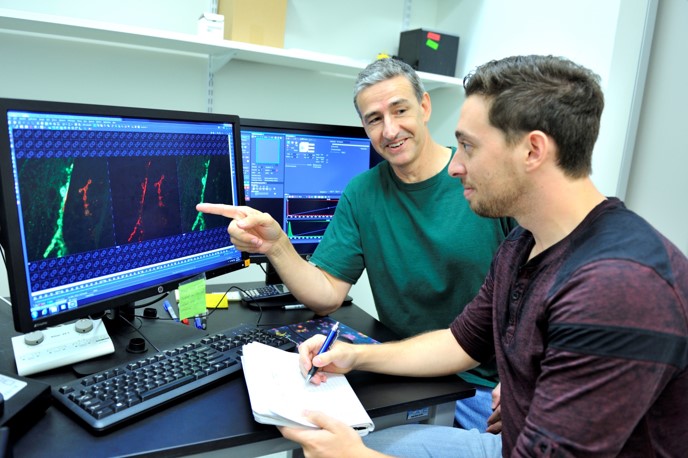 Dr. Greg Macleod
, Associate Professor in the Department of Biological Sciences and the Honors College and Jupiter Life Science Initiative faculty member, has received a four-year research grant from the National Institute for Neurological Disorders and Stroke (NINDS) totaling $387,919 ($120,815 direct to FAU) for his collaborative project with Dr. Kathaleen O'Connor-Giles from the University of Wisconsin-Madison. Their collaborative project entitled “Molecular Mechanisms of Synapse Assembly and Function" will characterize the function of a synaptic protein that has been linked to major depressive disorder and bipolar disorder. Aberrant synaptic function is a hallmark of neurological diseases ranging from autism to mental health disorders to neurodegeneration. Synaptic active zones (AZs) are specialized sites for the regulated release of neurotransmitter. Release dynamics vary significantly between AZs and are modulated in response to neural activity. Despite the importance of regulated neurotransmitter release to nervous system function, our understanding of how AZs are organized to achieve precise release properties and how they are reorganized in response to activity remains limited. A greater understanding of the proteins that organize the functional properties of synapses is likely to result in therapeutic advances.
Dr. Greg Macleod
, Associate Professor in the Department of Biological Sciences and the Honors College and Jupiter Life Science Initiative faculty member, has received a four-year research grant from the National Institute for Neurological Disorders and Stroke (NINDS) totaling $387,919 ($120,815 direct to FAU) for his collaborative project with Dr. Kathaleen O'Connor-Giles from the University of Wisconsin-Madison. Their collaborative project entitled “Molecular Mechanisms of Synapse Assembly and Function" will characterize the function of a synaptic protein that has been linked to major depressive disorder and bipolar disorder. Aberrant synaptic function is a hallmark of neurological diseases ranging from autism to mental health disorders to neurodegeneration. Synaptic active zones (AZs) are specialized sites for the regulated release of neurotransmitter. Release dynamics vary significantly between AZs and are modulated in response to neural activity. Despite the importance of regulated neurotransmitter release to nervous system function, our understanding of how AZs are organized to achieve precise release properties and how they are reorganized in response to activity remains limited. A greater understanding of the proteins that organize the functional properties of synapses is likely to result in therapeutic advances.